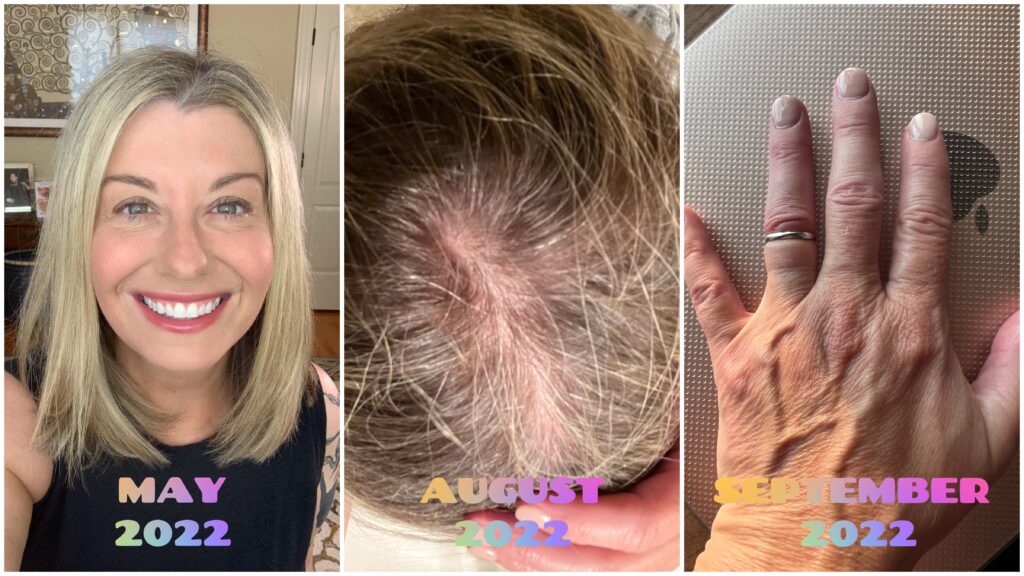Who’s ready for a slightly uncomfortable story?
The world seems like it’s teetering on the brink of madness, the earth is trying to reclaim itself from us humans, and there’s barely a day when I don’t daydream about moving to a safer corner of the world due to the relentless tide of gun violence and the ongoing assault on women’s rights. But hey, I’m on a roll and back to writing “Corporate Drinker: How to Survive, Thrive, and Build Culture in the Boozy World of Work.”
I even treated myself to high-quality reading glasses—no more squinting through lenses grabbed from a Target sale rack or a dusty gas station shelf.

Rewind to last summer, though, and I was in a different boat. An ambiguous diagnosis of “inflammatory arthritis” and an uncooperative frozen shoulder had me feeling like I was moving through molasses. Even staying productive on the computer was a test of endurance. My hands and feet swelled like water balloons, and my eyes felt drier than a summer day in the Arizona desert. Although I wasn’t on a liquid diet of corporate cocktails, I still drank 5-6 drinks a week.
Writing, my friends, is surprisingly strenuous. Sure, you’re mostly seated, but it burns mental and physical energy like nobody’s business. Looking back, I had severe doubts about whether I had the stamina to crank out another book. So, I started a long-ass health journey of finding experts who could help.
An orthopedist hit me with a volley of steroids to tackle the frozen shoulder. The result? A bloated face (aka “moon face”), and a thinning hairline. On the bright side, I could write again. Friends noticed the changes to my appearance, saying, “Only you’re really noticing your hair thinning. And yeah, your face looks a little more plump. Still adorable, but maybe go easy on the Botox?”

To clear the air, Botox doesn’t puff up your face. That’s the job of filler. And if my bank account balance were a bit healthier, I’d look like an aging cast member of Friends.
Once I tackled the frozen shoulder, I saw a rheumatologist who offered plenty of meds but not without the unsolicited advice: “The best thing you can do is lose weight.” Yeah, thanks, but no thanks. I fired him and then had to wait for a new rheumatologist for six months.
Now, I’m not great at waiting. I wanted to get on top of my health—emotionally and physically—and dive headfirst into “Corporate Drinker.”
So, I took matters into my own hands and did the following:
- Cut alcohol completely.
- Reluctantly invited animal protein back into my diet.
- Drank at least half my body weight in water daily.
- Implemented a strict cut-off for eating past 7:30 PM.
- Got cozy in bed by 9 PM.
By the end of 2022, my flare-up had cooled down a bit (though it was still lingering). I completed a half-marathon in January, caught COVID for the first time in February, and felt proud for bouncing back reasonably quickly.
When I finally met my new rheumatologist in March 2023, she was a breath of fresh air. I showed her that I was taking the reins on my health journey (not that she would’ve judged me if I’d shown up like a wrecking ball), and I trusted her when she made fresh medication recommendations.
As I write this, I’m not living an utterly alcohol-free life, but cutting back has been instrumental in managing my health. I’m more relaxed about my meal timing and bedtime now, too. But what I’ve gained is a new perspective on life. Sure, I might puff up again, my hair might stage a disappearing act, and that draining fatigue might make an unwelcome return. But ditching alcohol improved my overall health. And once you know something like that, you can’t just forget it.
Most scientists and clinicians agree that there is no genuinely healthy level of alcohol consumption. It’s toxic in any quantity and detrimental to our internal systems. Although American adults still have the right to treat our bodies as we see fit (freedom not always extended to individuals of childbearing age), there’s a growing conversation about the direct effects of alcohol, much like we had about cigarettes.
So, as I have reclaimed my energy, I’m excited to delve into these issues and more in “Corporate Drinker.” While I’m thrilled to return to work, the joy of feeling better outshines everything else. The role of alcohol in my journey isn’t lost on me—it might even make its way into the book. After all, we write what we know. But I hope my experiences make me a more compassionate and relatable author.
You must be logged in to post a comment.